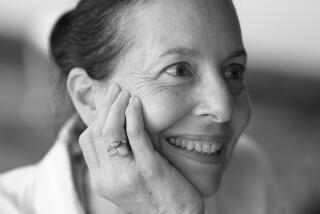E-Mail in a Bottle
- Share via
He’s an unlikely figure for a mass-media oracle, a modest, mild-mannered fellow easing into his 50s. But war often chooses its spokespersons, like its victims, arbitrarily.
Tamim Ansary’s moment came on Sept. 12 when he fired off an impassioned e-mail to a few close friends--or so he thought. Born in the Afghan capital of Kabul in 1948, the Bay Area children’s book author and Internet columnist was angry and alarmed by talk-radio callers urging the U.S. to bomb Kabul “back to the Stone Age” in retaliation for the previous day’s brutal attacks in New York and Washington.
Why bother, Ansary argued in his e-mail? After the war with the Soviets, a devastating civil war and several years of the Taliban’s oppressive rule, Kabul was already a wasteland.
Not that Ansary held any sympathy for the Taliban, the Al Qaeda terrorist network or its putative leader, Osama bin Laden. “When you think Taliban, think Nazis,” he wrote. “When you think Bin Laden, think Hitler.” But in the long run, leveling Afghanistan would only serve Bin Laden’s diabolical end of starting a war between Islam and the West. “Who has the belly for that?” Ansary’s e-mail concluded. “Bin Laden does. Anyone else?”
Like ripples from a stone tossed in a shallow pond, Ansary’s message radiated into cyberspace, exponentially replicating. Within days, his electronic in-box was flooded with thousands of responses from across the globe. Nearly all were supportive, and everyone from Oprah to ABC’s “World News Tonight” was calling, eager to anoint him the official voice of the long-suffering Afghan people.
From there it was a short, perhaps inevitable step to a book contract, and the publication of his urbane, accessible, compulsively readable memoir “West of Kabul, East of New York” (Farrar, Straus & Giroux), an account of a life split between contrasting cultures: Islamic Afghanistan and the secular West. An author tour brought him to Dutton’s Brentwood Books last Wednesday night for a reading and book-signing session.
Dressed in a brown suede jacket, black pants and a dress shirt unbuttoned at the neck, he read a chapter from his book and chatted casually while taking questions from the seven or eight people who had come to hear him.
“At first I felt weird about having stumbled into a position where I speak for other Afghans, and I still think it’s weird a little bit,” Ansary said, seating himself among the book stacks in a Dutton’s back room for an interview. “But I feel what I’ve been able to do is build a richer picture, so there is more appreciation, more sympathy for Afghans, and I think that they [Afghans] appreciate it.”
So does that mean he’s having fun in his new role? “‘Fun’ is a funny kind of word to use for it,” he said, genially but carefully. “What I say matters. You can’t buy that feeling, it’s a gift if that happens. I feel useful in a way that I hadn’t been before, and I feel called upon to rise to this occasion, and I feel good about myself because I feel I have been able to meet that challenge.”
If one senses the faintest aura of the pedagogue about Ansary, there may be good reason. After moving to the United States when he was still in his teens and earning a degree from Reed College in Oregon, Ansary has earned his living by writing textbooks and books for children. (He and his wife, who live in San Francisco, have two of their own.)
He also taps out a regular column for Microsoft Encarta, an online encyclopedia, doing his best to answer such Zen koan-like queries as: “Why are robins’ eggs blue?” And, “If you go outside today and it’s zero degrees, and you go outside tomorrow and it’s twice as cold, what temperature is it?” For the last two years, he said, he has been working on a series of books in which he has to summarize complex concepts in 25 words or less.
In his memoir, Ansary likewise steers clear of needlessly convoluted sentences and concepts. Crafted in straightforward, unassuming prose, “West of Kabul, East of New York” streamlines complicated ideas to a form that might make them comprehensible to any savvy seventh-grader. His brief recounting of Islam’s origins, for example--one of many stories within the story of his own family history--is as colloquial as it is concise.
His boyhood impression of the prophet Muhammad, he writes in a typically conversational paragraph, was of “a really great guy” who was “never tempted to claim any divinity for himself.”
Ansary said he didn’t have a detailed plan in mind when he mapped out his memoir. “I feel like the spirit in which I wrote my book is the same spirit in which I talk to people at the readings,” he said. “To call it a strategy would be to make it seem more thought out. As a literary person, you go more on intuition and you grope toward an effect.”
What remains slightly ironic is that Ansary is best known for an electronic missive of a few hundred words, dashed off in a state of high emotion, while his usual style of discourse is far more diplomatic and even-tempered. (In his e-mail, he labeled the Taliban “a cult of ignorant psychotics.”)
Still, he believes this unguardedness may have been a boon. “If I had written with a consciousness that I was going to write for thousands of people or for a public I didn’t know, and if I wrote with a sensitivity to making myself immune to criticism and judgment, it probably wouldn’t have been as effective a persuasive essay.”
The book was “surprisingly easy to write, as a piece of writing,” Ansary said, because he actually had started writing it two years ago, well before Sept. 11. “It wasn’t a book project, it was a personal ‘digging up my memories’ project,” he explained. “I think of it as a literary memoir. It’s about love and death, family and breakup, all that in the context of my life of being bicultural.”
Ansary’s awareness of his mixed heritage came early in life. Born into a privileged Kabul clan, his father was an Afghan who met Ansary’s Finnish American mother while pursuing a PhD in education in Chicago. When the couple married and moved back to Afghanistan in 1945, Ansary’s mother was the only American woman in Kabul.
Daily life revolved around an extensive network of relatives and the five-times daily ritual of prayers. While Kabul had barely made it into the 20th century by 1948, the year of his birth, “most of Afghanistan might as well have been living in Neolithic times,” he writes.
Ansary’s world was cleanly divided between his family’s walled compound and the outside. “Everything that made life worth living was private, and the splendid secret was there behind every door along that lane, behind every compound wall,” he writes. “Our group self was just as real as our individual selves, perhaps more so.”
But when he moved to the United States in 1964 to attend prep school, he took to American culture, growing his hair to his waist and worshipping Bob Dylan “back when his voice still worked.”
*
A Plan for a Return Visit to Afghanistan
Later, the family split up. Ansary’s father moved back to Afghanistan, and Ansary’s brother turned toward Islamic fundamentalism during a trip to Pakistan. That prompted Ansary to embark on his own pilgrimage in the late 1970s. He got as far as Turkey, though he was blocked from reentering his homeland.
He hopes to visit there for the first time in years this summer. “They [the Afghan government] are trying their best to attract back all the people like me,” he said, referring to the thousands of educated, upper-middle-class citizens who fled the country during the 1970s and ‘80s.
As far as repairing his battered and bloodied homeland, his response to a question at Wednesday’s reading suggested Ansary’s ambivalence.
“What would you like politicians and Americans to do now?” asked a man in a red bicycle helmet.
“I would like to see, in the immediate sense, the international peacekeepers must stay to keep fighting from breaking out,” Ansary replied. “The thing that I would want as an Afghan is a tall order: I would like the international community to help Afghanistan, and keep their mitts off.”
He laughed softly, acknowledging the paradox. “I feel like the first thing to do is clear land mines out of the field,” he went on. That way, he said, the country could begin to restore agricultural production and cultivating livestock, so that peasants won’t be tempted to grow poppies for opium instead.
After the reading, as the stragglers dispersed and the bookstore prepared to close for the night, Ansary got ready to join two friends for dinner. His next project, he said, will be a historical novel, details still to come. “It’s a personal journey. I’m going to rediscover my past.”
There was time for one last question: If he could put another message in a bottle and send it to the world, what would he write?
Ansary didn’t hesitate. “That was such a meeting of a moment and a guy,” he said, already turning toward his companions. “The moment was big. I don’t want another moment like that.”
More to Read
Sign up for our Book Club newsletter
Get the latest news, events and more from the Los Angeles Times Book Club, and help us get L.A. reading and talking.
You may occasionally receive promotional content from the Los Angeles Times.










